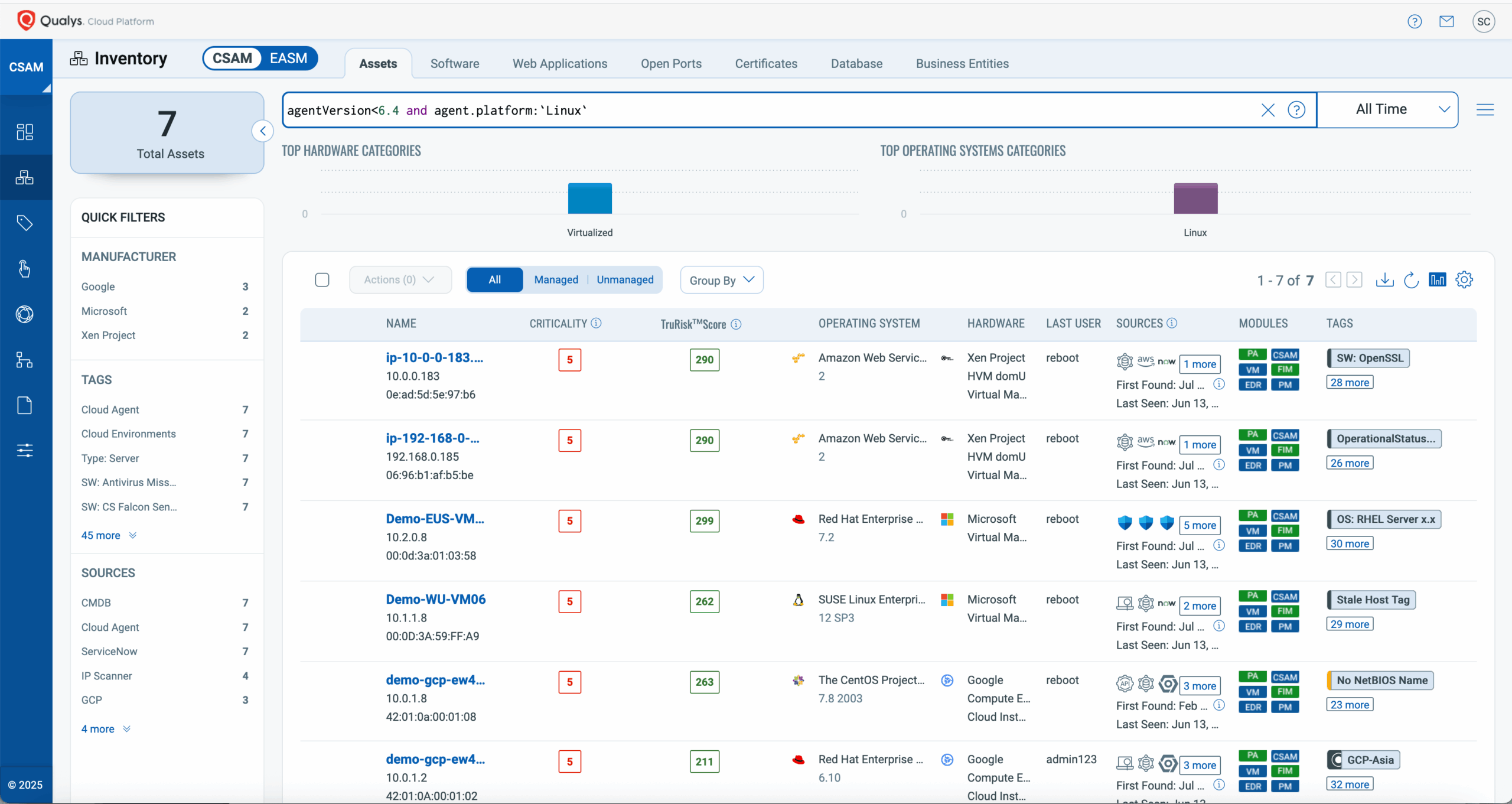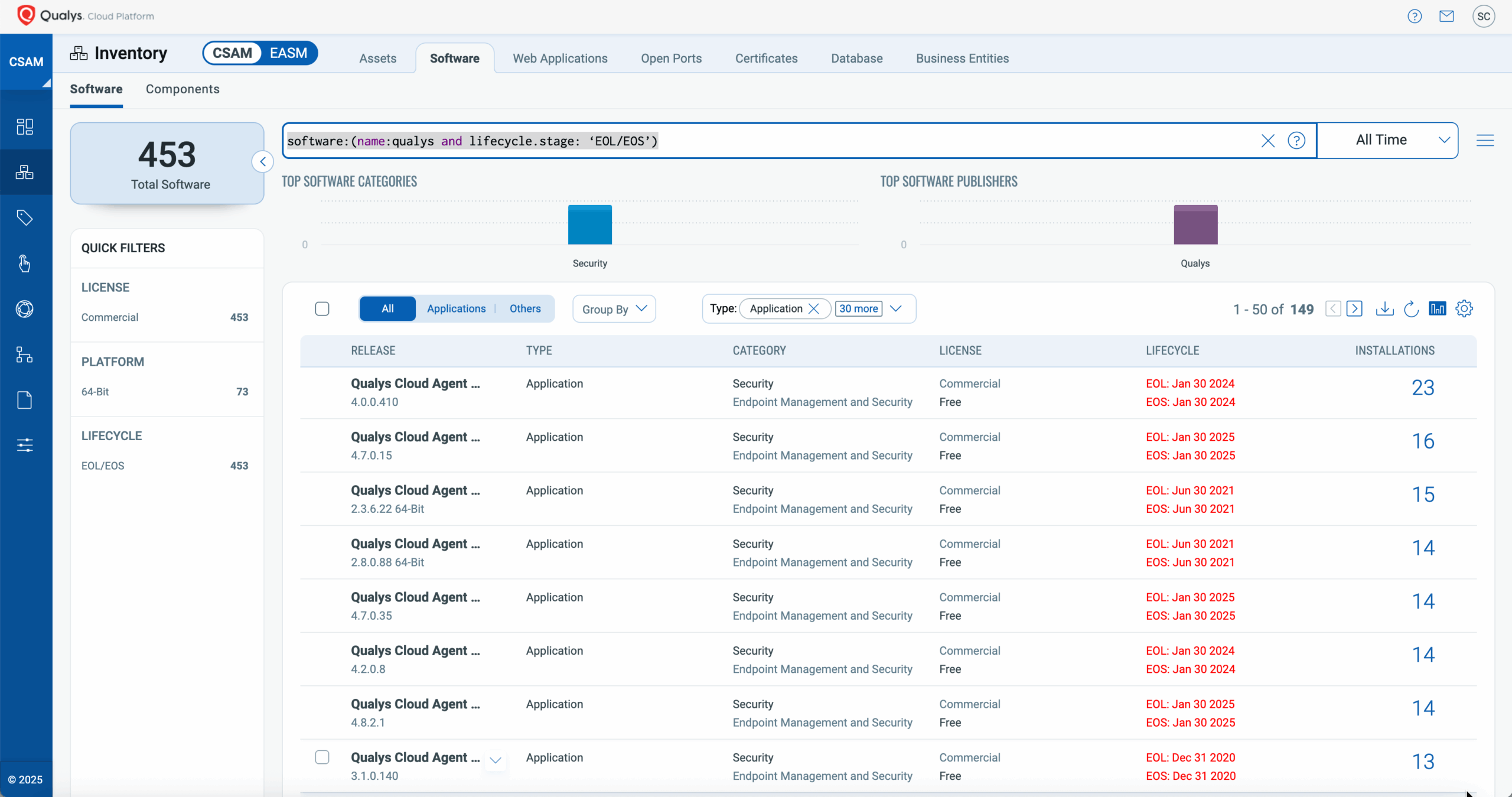End-of-Support Qualys Cloud Agent Versions for 2026
Overview
Each year, Qualys announces updated End-of-Support (EOS) versions for the Cloud Agent. This is part of our ongoing effort to deliver the most secure, high-performance agent framework by phasing out older versions and encouraging the adoption of newer, feature-rich releases.
Effective January 31, 2026, the following agent versions will move into end-of-support status. Agents in EOS status continue to operate, but with limited new functionality and reduced support:
- General Support Only: Access to documentation, KB articles, and upgrade guidance.
- No Standard Support: Engineering and bug fix support are no longer provided.
To continue receiving full support, customers must upgrade to a supported agent version.
End-of-Support Agent Versions (Effective January 31, 2026)
| Platform | Future EOS Agent Versions (Jan 2026) |
| BSD | Prior to 3.12 |
| CoreOS | Prior to 4.2 |
| IBM AIX | Prior to 4.20 |
| Linux | Prior to 6.4 |
| Linux ARM | Prior to 6.0 |
| Linux PowerPC | Prior to 3.21 |
| MacOS ARM | Prior to 5.5 |
| MacOS Intel | Prior to 5.5 |
| Solaris | Prior to 3.11 |
| Windows | Prior to 5.4 |
These versions will be flagged by QID 105961 starting February 2, 2026.
Current End-of-Support Agent Versions (as of 2025)
For reference, the following agent versions are already past EOS as of January 2025:
| Platform | Current EOS Agent Versions (2025) |
| BSD | Prior to 3.12 |
| CoreOS | Prior to 4.2 |
| IBM AIX | Prior to 4.17 |
| Linux | Prior to 5.0 |
| Linux ARM | Prior to 4.18 |
| Linux PowerPC | Prior to 3.21 |
| MacOS ARM | Prior to 5.0 |
| MacOS Intel | Prior to 5.0 |
| Solaris | Prior to 3.11 |
| Windows | Prior to 5.0 |
How to Find Agents That Are No Longer Supported Today
There are multiple ways to identify EOS agents in your environment:
QID 105961 – EOL/Obsolete Software: Qualys Cloud Agent Detected
This Qualys ID flags agents that are currently in EOS. On January 31, 2026, this QID will be updated to include the new EOS versions listed above.
Note: This is not a vulnerability QID. By default, all EOL QIDs are marked as Severity 5.
Option 1: Search by Agent Version
In CSAM, navigate to:
Inventory
Use a search filter like:
agentVersion<6.4 and platformType:’Linux’

Option 2: Search by Software Lifecycle Stage
In CSAM, navigate to:
Inventory > Software
Use the search filter:
software:(name:qualys and lifecycle.stage: ‘EOL/EOS’)

Option 3: Use the Cloud Agent Dashboard
The Cloud Agent dashboard includes built-in widgets to visualize your agent version distribution by platform. These widgets help quickly identify agents requiring upgrades.
What Action Do I Need to Take?
1. Upgrade All Existing Agents
Ensure your deployed agents are on versions above the EOS thresholds. Follow the guides linked below for upgrade instructions:
- AWS Bottlerocket Upgrade Guide
- BSD Upgrade Guide
- CoreOS Upgrade Guide
- Gentoo Linux Upgrade Guide
- Google Cloud Platform COS Upgrade Guide
- IBM AIX/Unix Upgrade Guide
- Linux Upgrade Guide
- MacOS Upgrade Guide
- PowerPC Upgrade Guide
- Solaris Upgrade Guide
- Windows Upgrade Guide
2. Use Latest Version for All New Deployments
Always install the most recent available agent version. The latest certified versions can be downloaded from the Cloud Agent UI. Refer to the Cloud Agent Platform Availability Matrix for up-to-date information.
Best Practices for Agent Binary Upgrade
- Best – Use the Auto-Upgrade Feature
Enable auto-upgrade in the agent’s Configuration Profile. Over 80% of Qualys customers use this method to stay current and benefit from the latest agent capabilities. Customers can leverage Agent Version Control to select as specific upgrade version. - Better – Quarterly Upgrade Cycle
If auto-upgrade is not an option, manually certify and upgrade agents at least quarterly using your preferred package or configuration management tool (SCCM, Ansible, Chef, etc.). - Good – Upgrade as Needed
Perform upgrades in response to EOS notifications or platform-specific feature requirements. While better than no upgrades, this approach may delay access to new capabilities or optimizations.
Remember to Update Gold Images Quarterly
Even if auto-upgrade is enabled, ensure your organization’s gold images are updated every quarter. This prevents outdated agents from being redeployed and accumulating in production.
Questions?
Please reach out to your Technical Account Manager (TAM) or visit Qualys Support for help.